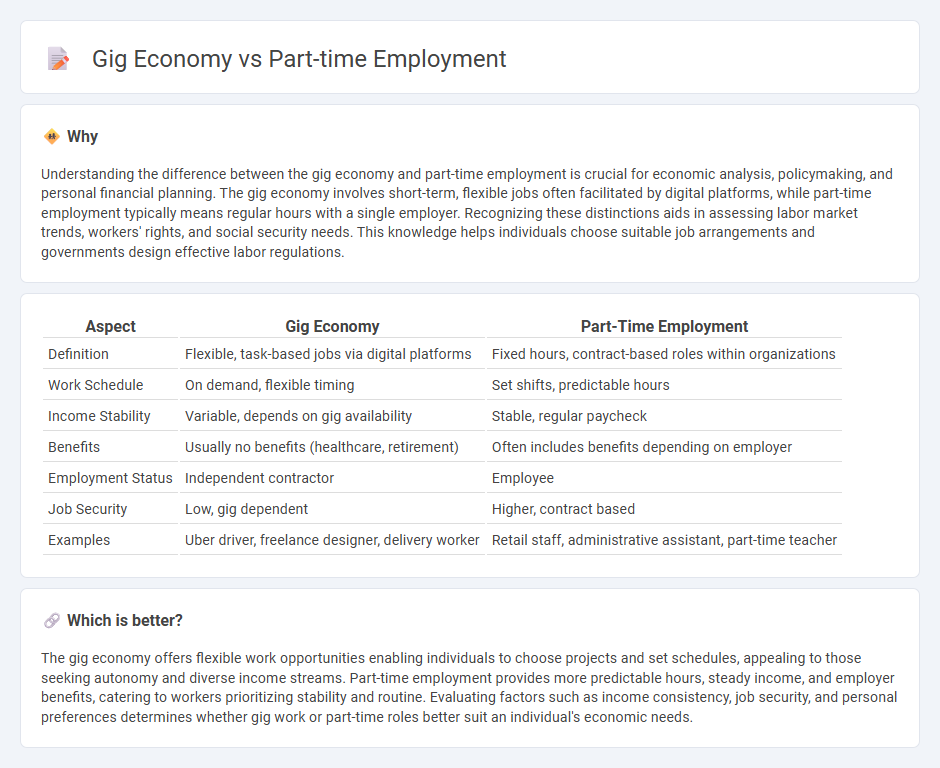
The gig economy represents a flexible workforce model where individuals engage in temporary, freelance tasks facilitated by digital platforms, differing from traditional part-time employment characterized by fixed hours and employer-employee relationships. Gig workers benefit from autonomy and varied income streams, while part-time employees gain stability and employment benefits. Explore in-depth comparisons of economic impacts, worker rights, and market trends to understand the evolving labor landscape.
Why it is important
Understanding the difference between the gig economy and part-time employment is crucial for economic analysis, policymaking, and personal financial planning. The gig economy involves short-term, flexible jobs often facilitated by digital platforms, while part-time employment typically means regular hours with a single employer. Recognizing these distinctions aids in assessing labor market trends, workers' rights, and social security needs. This knowledge helps individuals choose suitable job arrangements and governments design effective labor regulations.
Comparison Table
| Aspect | Gig Economy | Part-Time Employment |
|---|---|---|
| Definition | Flexible, task-based jobs via digital platforms | Fixed hours, contract-based roles within organizations |
| Work Schedule | On demand, flexible timing | Set shifts, predictable hours |
| Income Stability | Variable, depends on gig availability | Stable, regular paycheck |
| Benefits | Usually no benefits (healthcare, retirement) | Often includes benefits depending on employer |
| Employment Status | Independent contractor | Employee |
| Job Security | Low, gig dependent | Higher, contract based |
| Examples | Uber driver, freelance designer, delivery worker | Retail staff, administrative assistant, part-time teacher |
Which is better?
The gig economy offers flexible work opportunities enabling individuals to choose projects and set schedules, appealing to those seeking autonomy and diverse income streams. Part-time employment provides more predictable hours, steady income, and employer benefits, catering to workers prioritizing stability and routine. Evaluating factors such as income consistency, job security, and personal preferences determines whether gig work or part-time roles better suit an individual's economic needs.
Connection
The gig economy relies heavily on part-time employment, offering flexible job opportunities that value short-term contracts and freelance work. Part-time employment in the gig economy allows workers to balance multiple income streams while businesses reduce labor costs and increase operational agility. This interconnected dynamic drives a shift toward non-traditional work arrangements, influencing labor market trends and economic productivity.
Key Terms
Flexibility
Part-time employment typically offers a set schedule with predictable hours, providing moderate flexibility for workers balancing other commitments. In contrast, the gig economy allows individuals to choose when and how often they work, maximizing flexibility but often lacking job security and benefits. Explore more about how flexibility impacts income and lifestyle in these work models.
Job Security
Part-time employment typically offers greater job security through consistent hours, employee benefits, and legal protections under labor laws. In contrast, the gig economy provides flexible work arrangements but often lacks stability, benefits, and guaranteed income, increasing financial uncertainty for gig workers. Explore deeper insights into job security differences between these employment types to make informed career decisions.
Income Stability
Part-time employment offers steady income with predictable hours, making it a reliable choice for financial planning and budgeting. In contrast, gig economy jobs provide flexible schedules but come with fluctuating earnings and inconsistent work availability, posing challenges for income stability. Explore more to understand how each option affects long-term financial security and career growth.
Source and External Links
Part-time job - Wikipedia - A part-time job is employment with fewer hours per week than full-time, typically less than 30 hours, offering flexible scheduling and often used to balance work with other commitments.
Understanding Part-Time Jobs: Definition, Benefits, and Opportunities - Part-time jobs generally involve working 20-30 hours weekly, providing flexibility, work-life balance, and additional income, but may have limited benefits and job security.
Part-Time vs Full-Time: How Many Hours & How to Classify? - In the U.S., part-time work is usually 1-34 hours per week, with classifications and benefits varying by employer but often including prorated pay and fewer benefits than full-time work.
 dowidth.com
dowidth.com